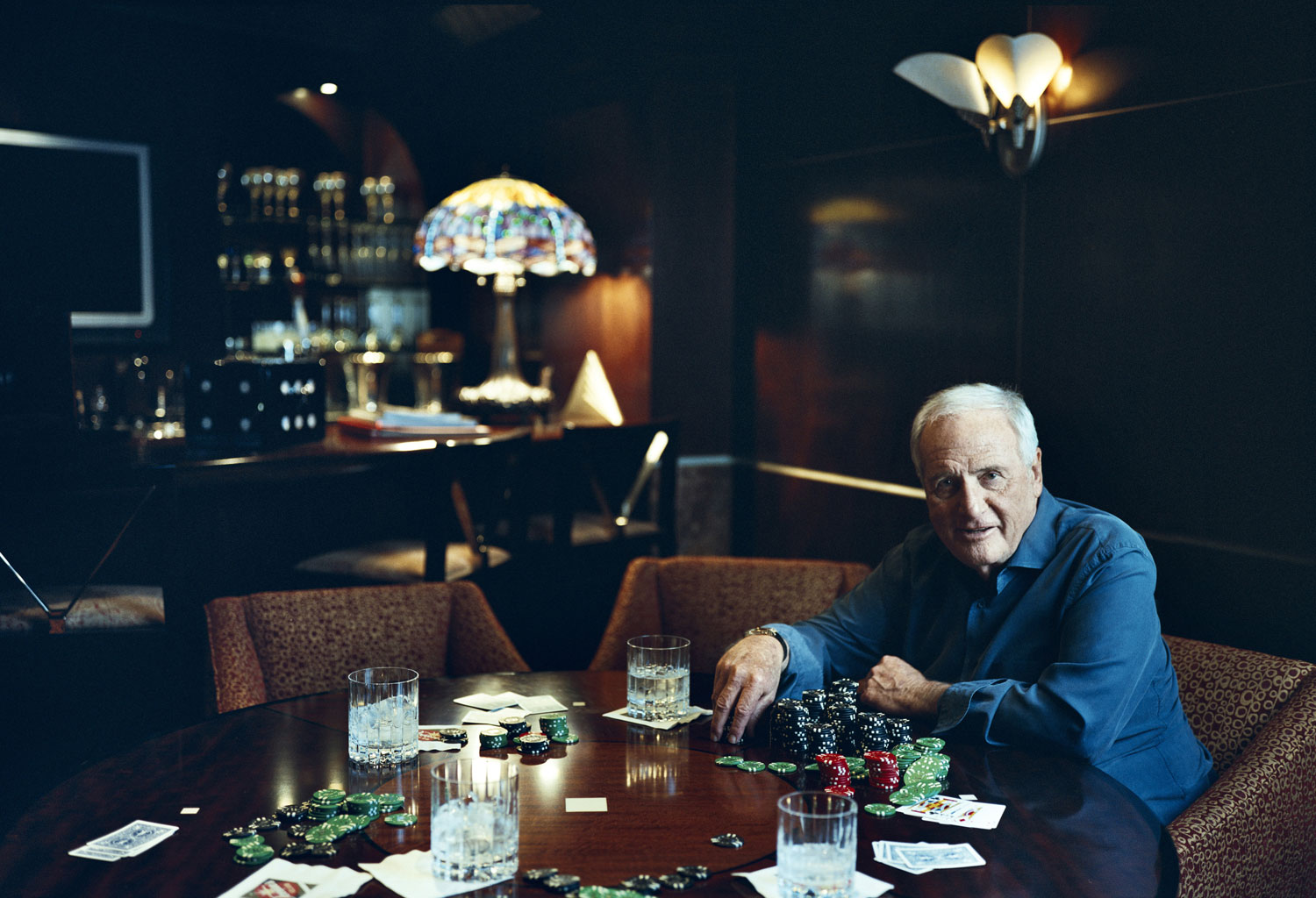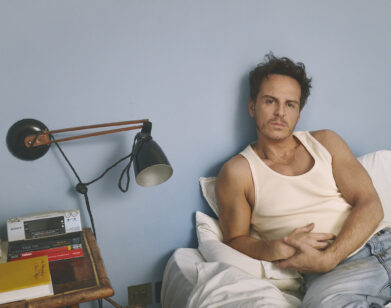Jerry Weintraub’s Production Values

JERRY WEINTRAUB
There’s a photograph of Jerry Weintraub in his memoir, When I Stop Talking, You’ll Know I’m Dead, where the legendary producer and personal manager is sitting in a director’s chair on the set of The Next Karate Kid looking especially relaxed. Smiling boyishly and wearing a denim shirt, sleeves rolled, coffee in one hand, cigar in the other, Weintraub could just as easily be kicking back at a friend’s barbecue as producing one of Hollywood’s most popular movie franchises.
Inspired by Weintraub’s autobiography, the feature-length documentary His Way premieres tonight on HBO. Directed by Douglas McGrath, produced by Graydon Carter and Gabe and Alan Polsky, and executive produced by Steven Soderbergh, His Way chronicles the self-made, five-decade career of the Brooklyn-born and Bronx-raised entrepreneur who imagined Sinatra’s comeback, toured with Elvis, and gave us characters like Eddie, Boogie, Shrevie, Danny Ocean, Rusty and Reuben, and, of course, Mr. Miyagi.
Pieced together with interviews from family and close friends—Elliott Gould, Ellen Barkin, George Clooney, Matt Damon—as well as his wife, Jane Morgan (they’re separated, but still close), and his girlfriend of twenty years, Susie Ekins, Weintraub’s “no means maybe” persuasive charm and prolific career unfolds much like the movies he’s always championed: underdog passion matched by compelling stories and rich, deeply funny characters.
“He’s Houdini!” shouts James Caan. “A rare bird,” muses Barbara Bush. “You can’t buy him dinner,” jokes Bruce Willis. Drawing parallels to “the greatest show on earth,” Brad Pitt refers to his friend as Barnum and Bailey—praise that most aptly agrees with Weintraub’s big-top love for showbiz. We spoke with Weintraub about storytelling, his attraction to franchises, and the two women in his life; relationships, he notes, that are at the heart of this movie and his life.
DURGA CHEW-BOSE: Where does your love for storytelling stem from?
JERRY WEINTRAUB: When I was a young boy, very young boy, mothers didn’t work. Women were home, they took care of the house, they washed the dishes and took care of the children. That’s what they did, and that’s what my mother did. And my mother was a voracious reader because she was afraid of everything in the world. She was afraid to travel, she was afraid to go above the second floor, she was afraid of the streetcars, she was afraid of everything! We never lived above the second floor, because she wanted to be close enough to jump down if anything happened. And she lived her life through movies and books—she read everything there was to read. And she read to me every night. I never went to sleep without her reading to me. And she fantasized about the book and she would talk about it, the place, and you would think that after she read the book and after she told you stories about it, that she had actually been there. Now my father, on the other hand, did travel, and did go to places all over the world. And she knew about everything he came back and talked about; she knew because she read about it. And I learned about story from her, and I learned the value of a great story, and the value of great characters. Then, as my life went on and I met Sinatra and people like that, and I watched live performers on stage, I learned how to tell a story. Because if you listen to Sinatra, all of his songs are stories; there’s a beginning, middle, and end. So that’s where it comes from.
CHEW-BOSE: Do you think that’s what draws you to the films you’ve produced—because a lot of them, like Diner, are character movies?
WEINTRAUB: Yeah, it’s always characters. That’s what I do. I do characters. I believe in that. I think people are interesting. Now, everybody that you meet in New York City thinks that their life is a movie. [laughs] Everyone! [laughs] And it’s not. But there are interesting characters and there are interesting stories. There’s a story on every street corner. I love it. I think that’s what really attracts me to making films.
CHEW-BOSE: With Diner, when the studio execs were refusing to release it, what was it like contacting Pauline Kael and asking her to review it anyways?
WEINTRAUB: She had seen Nashville, and she loved Nashville. When I called her, she immediately responded to me because we had become friends, and I told her how great this film was, and she told me, “Well, I’ll have to see it for myself.” So I showed it to her, and she flipped.
CHEW-BOSE: And that’s when they decided they were going to release it…
WEINTRAUB: Well, I decided for them! [laughs]
CHEW-BOSE: At the very beginning of His Way, you’re telling a story and you say, “So I devised a plan…” which could very well have been the title of the movie. Whenever someone says no to you, you hear “maybe,” and that sort of thing. Whenever an obstacle arises, you’re always quick to find a solution…
WEINTRAUB: It’s just that things go on in my head and I figure out how to make it happen. And I just don’t believe that you can’t make anything happen. I think if something’s good and you believe in it, and you care about it, and you give it love and nurture it, it’s going to happen.
CHEW-BOSE: Has there ever been a time when you haven’t felt that way?
WEINTRAUB: No.
CHEW-BOSE: Never?
WEINTRAUB: No. Even when I was a kid.
CHEW-BOSE: George Clooney says that you’re “the last of your kind.” What does that meant to you?
WEINTRAUB: That’s a nice quote, you know. I kind of like that quote. I’m a guy who shakes your hand and will never let you down. I have a code of honor and I don’t lie. I have a code of honor about life and that’s what he meant. And you don’t need a contract with me.
CHEW-BOSE: What was it like watching all those interviews of your friends talking candidly about you? There’s one moment in particular, where Julia Roberts is talking about your marriage, and she starts to get a little uncomfortable and starts to look over her shoulder…
WEINTRAUB: That’s Julia! It was fine. It’s an honor, really. I don’t mean to sit here and be humble, ’cause I’m not humble. I am humble but I’m not humble-humble. It was an honor, and I cried the first time I saw the film. Because to have people of that caliber take the time to sit down and give a day or two of their lives to a film about me, that they’re not getting paid for, is pretty extraordinary.
CHEW-BOSE: Is working with your friends—like in the Ocean’s franchise—a factor when it comes to choosing projects?
WEINTRAUB: It’s easier. I mean, I know everybody. I make friends easily. I’m a gregarious guy, I’m open, I’m easy to get to know—I don’t lock myself in an ivory tower. So I like people; I enjoy people.
CHEW-BOSE: In the movie, the story shifts from your professional life to your marriage. Were you at first keen about this, or did you have reservations?
WEINTRAUB: Well that story about the two women in my life is—a lot of people get upset, a lot of people question it. Steven Soderbergh said to me, “The story of your life is incredible. The real story of your life that’s interesting, more interesting than all the other stuff—the franchises, the movies, the songs, Elvis Presley, Frank Sinatra—the real thing that’s interesting and unbelievable is the relationship with these two women. And if you’re willing to put that out there, you know then, you’re going to have a great movie. Because that’s the movie. That’s the guts of the movie.” And that is the movie, and I’m very proud of those relationships because they’re very strong. They’re much stronger than many of the relationships I’ve seen.
CHEW-BOSE: What was it like hearing different people’s takes on your life?
WEINTRAUB: I don’t know because I didn’t hear…
CHEW-BOSE: You only saw the final cut?
WEINTRAUB: Yeah.
CHEW-BOSE: Was that strange and hard for you as a producer?
WEINTRAUB: For me, yes. But I had to do it. And I didn’t really know what McGrath was doing. They asked everybody the same question and somebody would start the story and he’d cut in with somebody telling the middle and then somebody else, ending it.
CHEW-BOSE: When you’re remembering a story, you’re physically telling it, you’re so alive… I’m sure it’s fun to have you at dinner.
WEINTRAUB: I just do it, I don’t know what I’m doing! It’s who I am. Yeah, I’m a good party guest…the problem is, I feel like I’m working all the time. “Give us an Elvis story! Give us a Frank story!”
CHEW-BOSE: What do you like so much about franchises?
WEINTRAUB: Money! [laughs] They go together. Franchise; money. Money; franchise.
CHEW-BOSE: And not to wrap up on a low note, but in that part of your career that dipped and you were in a slump, what was some of the best advice you received during that time?
WEINTRAUB: Well, I didn’t get advice, but the best thing that happened from that situation was the fact that I failed and I failed because I was trying to do things that I don’t like to do. I like to make movies and I like the creative process. I don’t really care about the business end of it. It’s not my thing. So I was all of sudden totally immersed in the business end of it and dealing with human resources, lawyers, and accountants, and so on. It wasn’t for me.
CHEW-BOSE: So now you do it for you?
WEINTRAUB: Right.
HIS WAY PREMIERES TONIGHT AT 9 PM ON HBO.






